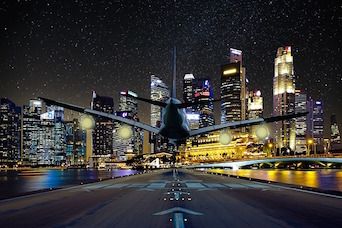How to Beat Jet Lag
Flying across time zones — whether for work or pleasure — is likely to cause the phenomenon known as jet lag. Here are some tips to avoid this state of energy depletion and enjoy your destination.

If you’ve ever traveled by air through two or more time zones, chances are you’ve experienced jet lag. Jet lag occurs when our circadian rhythms are not aligned with our environment. We become drowsy, depleted of energy, unproductive and unable to do what we traveled such a long way to do. And when we return home these symptoms may be even worse.
As researchers continue to study how jet lag affects the human body, more and more information is becoming available to help travelers get their sleeping schedule on track faster and more efficiently.
RELATED:
- Are You Suffering from Social Jet Lag?
- Animals Are Flying In the Lap of Luxury at JFK
Here are some tips to remember the next time you’re traveling to a different time zone.
Light Is Key
If you’re traveling from the East Coast to the West Coast, be sure to get evening exposure to light. If you’re traveling west to east, do the opposite: Expose yourself to adundant morning light.
This is sometimes easier said than done. The best way is to physically go outside into the sunlight. If that’s not possible, a portable light box or other bright, continuous light source will help. On the other hand, wearing dark sunglasses and staying indoors during the brightest hours of the day will exacerbate the effects of jet lag.
Alternative Scheduling
Steering clear of the side effects of jet lag is all about training your body to operate on a new circadian schedule while you’re at your new destination. Adjusting to a new time zone is difficult because of the lights and sounds of the new location, but putting yourself on an alternative schedule will synchronize your body more quickly. Apps such as Entrain claim to provide an alternative schedule to do just that after tracking your circadian clock and what schedule you need to adjust to.
Melatonin
Medicating oneself in order to sleep on a plane is not always the best option to fight jet lag. Instead, try taking melatonin to get your sleeping schedule on track.
Melatonin is a nutraceutical that is said to have two effects: changing the circadian clock and acting as a mild hypnotic. This mild sleep aid is said to be most effective during the daytime hours when your body makes it difficult to go against your circadian clock and fall asleep soundly. Taking melatonin at night may help with falling asleep, but it doesn’t have as much of an effect at that time of day.
Prophylactic Napping
To avoid the effects of jet lag, travelers commonly choose to make themselves go to bed earlier or stay up later than they usually would. When traveling from east to west, you’ll likely stay awake later at your destination, so taking a nap early on in the day can help.
When traveling west to east, though, It can be difficult to make yourself fall asleep. Bedtime will come quicker than usual, but your body may not allow sleep to come. To help, try making your bedroom pitch black with blackout curtains, turning off all technology in your room or playing a sound machine.
Happy travels!